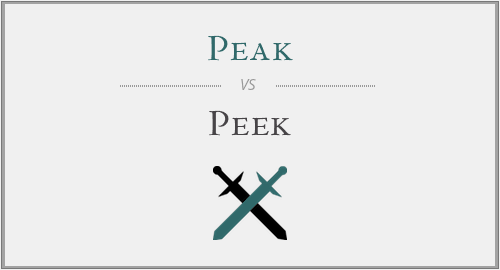Let's take a closer look to what "peak" and "peek" mean in order to clarify every puzzling aspect of "peak vs. peek".
Peak vs. Peek
Not only are these words phonetically similar, but also syntactically, as both "peak" and "peek" can appear as verbs and nouns in sentences. Even so, their meanings are completely different, which makes it a little easier to remember their significations. If you wait until the end of the article, you will find a trick that will help you remember what a word means, in order to easily distinguish it from the other.
When do we use "peak"?
As noun, "peak" is used to define the highest value or level or something. But, in certain contexts, it can also mean the top of a mountain or even the mountain itself. "Peak" can also function as a verb, representing the action of reaching towards the highest value or level of something. Find some relevant examples below:
Example 1: An athlete at the peak of fitness is more qualified to answer your questions about training than a beginner. - "peak" is used as a noun to define the highest value or level of something.
Example 2: The mountain peak was covered in snow - it was a mesmerizing landscape! - "peak" can also refer to the top of a mountain.
Example 3: If you keep evolving like this, you'll get to the peak of your career in less than 6 months! - as a verb, "peak" is used to refer to the action of reaching towards the highest level or value.
When do we use "peek"?

Although we stated above that both "peak" and "peak" can appear both as nouns and verbs in sentences, "peek" is actually a lot less used as a noun. In other words, "peek" only appears as a noun in a certain expression, and that is "having/taking" a peek, which means to look at something for a short while. "Peek" is in general used as a verb, and it defines the action of looking at something for a short while, usually not wanting other people to see you.
Example 1: I only had a peek to see what they were doing; I couldn't see well. "Peek" is only used as a noun in the exemplified expression, referring to the same action that the verb "peek" refers to: looking at something for a short time.
Example 2: I will peek out the window to see if they are still here. - "peek" represents the action of looking at something for a short while.
Conclusion
A short trick to remember which word means what is to keep in mind that "peak" contains an "a". Think about the form of the letter "A" - it's just like a mountain, or like the peak of the mountain. That is a great clue to trigger your memory to remember that "peak" refers to the highest value or level of something, or to the top of a mountain.
Once you know what "peak" means, you'll also figure out that "peek" carries the other definition, which is looking at something for a short while, usually from a hidden spot.




Have a discussion about this article with the community:
Report Comment
We're doing our best to make sure our content is useful, accurate and safe.
If by any chance you spot an inappropriate comment while navigating through our website please use this form to let us know, and we'll take care of it shortly.
Attachment
You need to be logged in to favorite.
Log In